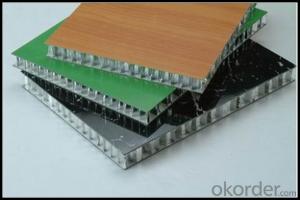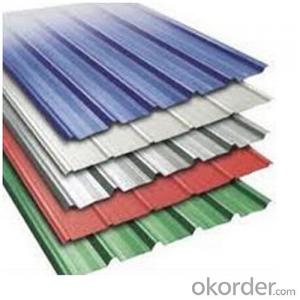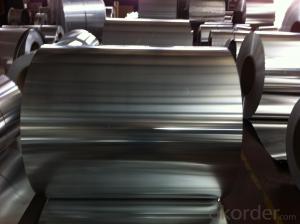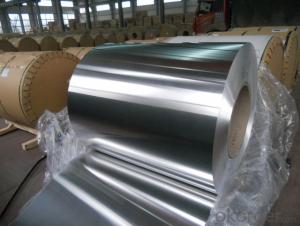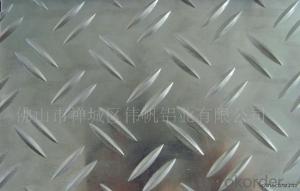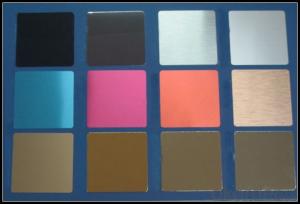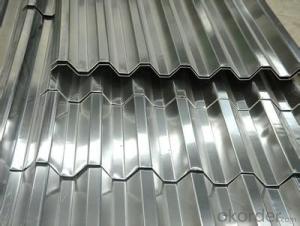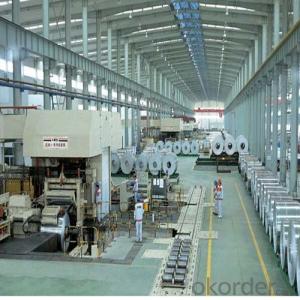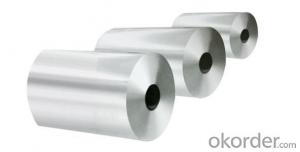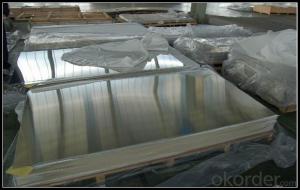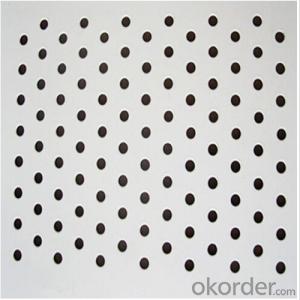Gold Aluminum Foil Sheets for Decorative Aluminum Roof Panels Supply
- Loading Port:
- Shanghai
- Payment Terms:
- TT OR LC
- Min Order Qty:
- 5 m.t.
- Supply Capability:
- 100000 m.t./month
OKorder Service Pledge
OKorder Financial Service
You Might Also Like
Specification
1.Structure of Aluminum Roof Panels for Decoration Supply
Aluminum Sheets are strengthened and cut from raw materials with different alloys, such as AA5005, AA5052, etc. They are easy for processing in different shapes, good in intensity and can be quickly installed. Aluminium Sheets for Energy Saving Curtain Walls are good in energy saving, weather resistance, fire resistance, easy for maintenance and with many colors.
Aluminium Sheets for Energy Saving Curtain Walls are widely used in construction of metal walls, metal ceilings, car decoration, advertizing panels, etc.
2.Main Features of Aluminum Roof Panels for Decoration Supply
•High intensity
•Easy to be processed and shaped
•Weather resistance
•Anti-pollution & environment protection
3. Aluminum Roof Panels for Decoration Supply Images
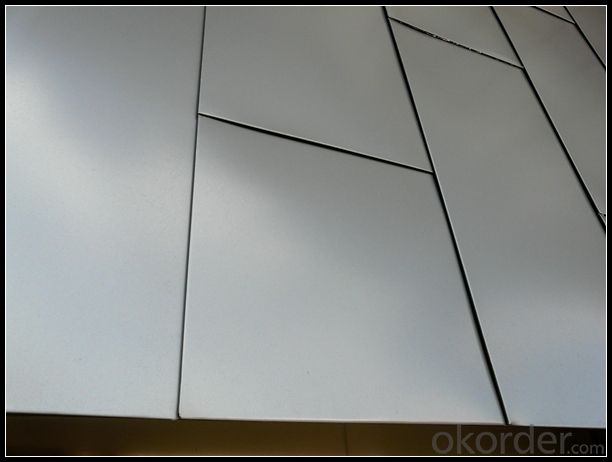
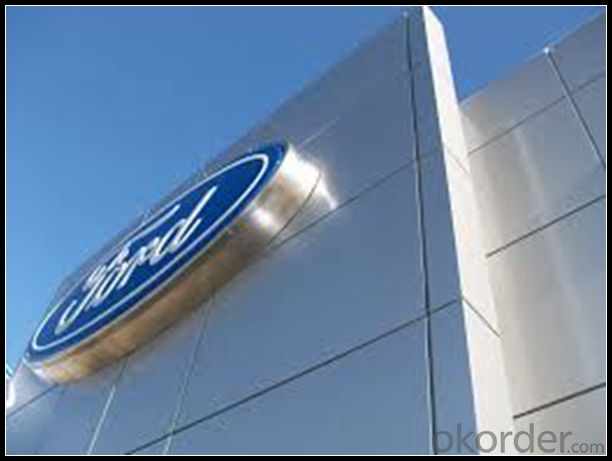
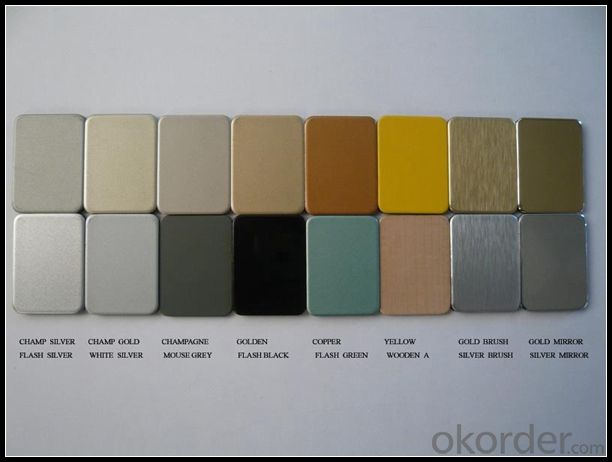
4.Specification of Aluminum Roof Panels for Decoration Supply
Alloy Number | AA5XXX |
Temper | H12, H14, H16, H18, H22, H24, H26, H32, HO, F |
Thickness | 0.1mm – 500mm |
Width | 10mm- 2200mm |
Standard | GB/T3880-2006, ASTM, ISO, EU standard |
5.FAQ
A.What about inspections to guarantee quality?
For each order for Aluminum Sheets with Mill Finished Surface AA5XXX, we will arrange strict inspection for raw materials, inspection during production and inspection for finished goods.
With requirement of customers, we also can arrange the third party inspection.
B.What about delivery?
We will put order for Aluminum Sheets with Mill Finished Surface AA5XXX in production schedule after order gets confirmed against copy of TT or L/C. Normally it takes about one month for production. Exact shipment schedule is different based on different sizes and quantity.
C.What is the MOQ?
5 tons for each size.
D. Where have you exported aluminium sheets?
We have exported aluminum sheets to many countries. Main markets include South East Asia, Middle East, North America, South America, etc.
- Q: can the oxide film on the surface of aluminum sheet prevent the erosion of acid liquid? Why?
- yes, acid can react with aluminum oxide , generating salt and water, but its anti-corrosion will be stronger if oxide film on the surface is enough dense.
- Q: the aluminium pull tabs are in a jucy juice bottle
- So saving pull tabs isn't a complete waste of time. But let's make one thing clear: *there's nothing special about pull tabs*. You'd save yourself a heap o' trouble and make a lot more money if you recycled the whole can. The Reynolds and kidney foundation people have tried to get that point across with a poster showing a red Ghost busters-type slash through a cartoon of someone trying to detach a pull tab from a can. The headline says, Keep Tabs on Your Cans. But the public hasn't gotten the message. Supposedly responsible people -- e.g., the honchos at your school -- will organize pull tab collection drives without even bothering to get the whole story. Urban legends expert Jan Brunvand reports that in 1989 a Minneapolis VFW post organized a pull tab collection drive for the local Ronald McDonald House. When Brunvand asked the organizers why they didn't tell people to save whole cans, they lamely replied that there were hygiene problems and that people liked mailing in the tabs, even though the postage often exceeded the value of the aluminum. In other words, it's not important to *do* good as long as people *feel* good. Sometimes I don't think we have enough common sense in this country to fill a teacup.
- Q: 8mm which type of aluminum plate is suitable for bending?
- What is your bending angle?If only bending is required, the quality of the aluminum sheet is of little concern.First of all, the state is the most important, the state is divided into hard, semi hard, soft (usually soft called O state)(1) the bending effect of the whole hard is not too far (the aluminum plate is H18, H19, H38 and so on are all hard)(2) the aluminum sheet in the semi hard state can be basically bent (H24, that is, semi hard)(3) the bending of the O state is certainly not a problem, but as a result of being too soft, there is little bending in this stateSecond, you have to choose pure aluminum or alloy aluminum?Pure aluminum hardness is not very good, with 1100, 1050, 1060 and so on can be recommended 1100 H26Alloy aluminum hardness is better, can use 3003, 3005, 5052 and other semi hard state can be.
- Q: Are aluminum sheets suitable for marine hulls?
- Indeed, marine hulls can indeed be made using aluminum sheets. The utilization of aluminum in boat construction is widespread due to its numerous advantageous properties. The lightweight nature of aluminum enables enhanced fuel efficiency and increased speed. Furthermore, its exceptional resistance to corrosion renders it well-suited for prolonged exposure to saltwater. Moreover, aluminum possesses remarkable strength and durability, thereby ensuring the integrity of the hull's structure. Additionally, aluminum can be easily manipulated into intricate shapes, allowing for the creation of innovative hull designs. In summary, aluminum sheets represent a dependable and efficient option for marine hulls, delivering a robust and corrosion-resistant framework that enhances the boat's performance and lifespan.
- Q: Can aluminum sheets be anodized?
- Aluminum sheets are capable of undergoing anodization, which is an electrochemical procedure responsible for generating a safeguarding oxide layer on the aluminum's surface. This particular layer amplifies the metal's resistance against corrosion, its endurance, and its overall appeal. Anodization is widely utilized in various industries, such as automotive, aerospace, and construction, in order to furnish aluminum sheets with a defensive coating and enhance their visual aesthetics. The process entails submerging the aluminum sheet into an acidic electrolyte solution and subsequently passing an electric current through it. As a result, oxygen ions merge with the aluminum atoms and construct the oxide layer. This layer can be further augmented by incorporating dyes or pigments, resulting in diverse colors and finishes. All in all, anodization proves to be an adaptable and efficient technique for treating aluminum sheets.
- Q: Are aluminum sheets resistant to saltwater corrosion?
- Generally, aluminum sheets exhibit resistance to corrosion from saltwater. When exposed to air or water, including saltwater, aluminum naturally develops a protective oxide layer. This layer serves as a barrier, preventing additional corrosion and safeguarding the underlying metal. Furthermore, aluminum is both lightweight and durable, making it a favored choice for numerous marine applications such as boats, shipbuilding, and offshore structures. Nevertheless, it is important to acknowledge that the level of resistance to saltwater corrosion may differ based on the specific alloy and surface treatment of the aluminum sheets. Consequently, selecting the appropriate alloy and applying protective coatings can further enhance the corrosion resistance of aluminum sheets in saltwater environments.
- Q: Can aluminum sheets be laminated with other materials?
- Yes, aluminum sheets can be laminated with other materials. Lamination involves bonding different layers together to create a composite material with enhanced properties and functionality. Aluminum sheets can be laminated with various materials such as polymers, fabrics, or other metals to improve their strength, durability, insulation, or aesthetic appearance. This process allows for the customization and optimization of aluminum sheets for specific applications.
- Q: Can aluminum sheet be used for electronic components?
- Yes, aluminum sheet can be used for electronic components. Aluminum is a versatile material that offers several advantages for electronic applications. It is lightweight, has excellent thermal conductivity, and is resistant to corrosion. These properties make it suitable for a wide range of electronic components, such as heat sinks, enclosures, connectors, and printed circuit boards (PCBs). Aluminum sheets can be easily machined, formed, and welded, allowing for efficient manufacturing processes. Additionally, aluminum is a cost-effective material compared to alternatives like copper or steel. However, it is important to note that aluminum is not suitable for all electronic components, especially those that require high electrical conductivity or magnetic shielding.
- Q: Can aluminum sheets be used for kitchen backsplashes?
- Yes, aluminum sheets can be used for kitchen backsplashes. Aluminum is a versatile and durable material that is commonly used for various applications, including backsplashes in kitchens. It offers several advantages such as being lightweight, corrosion-resistant, and easy to clean. Aluminum sheets can be easily cut and installed, making them a popular choice for modern kitchen designs. Additionally, they are available in a wide range of finishes and colors, allowing homeowners to find a style that complements their kitchen décor. Overall, aluminum sheets are an excellent option for kitchen backsplashes due to their practicality, aesthetic appeal, and ability to withstand the demands of a busy kitchen environment.
- Q: How does the surface treatment affect the corrosion resistance of aluminum sheet?
- Enhancing the corrosion resistance of aluminum sheet is greatly influenced by its surface treatment. Aluminum itself possesses inherent corrosion resistance due to the formation of a thin oxide layer on its surface. However, this oxide layer may not always be sufficient in safeguarding the metal against aggressive environments or harsh conditions. To significantly improve the corrosion resistance of aluminum sheet, various surface treatments such as anodizing, chromating, or painting can be employed. Anodizing involves the creation of a controlled oxide layer on the aluminum's surface through an electrochemical process. This layer exhibits high resistance to corrosion and effectively protects the metal from various corrosive agents. On the other hand, chromating involves the application of a chromate conversion coating that forms a thin film on the aluminum surface. This coating acts as a barrier, preventing the penetration of corrosive substances and subsequent oxidation. Additionally, it enhances the adhesion of subsequent paint or adhesive layers. Painting is another commonly utilized surface treatment for aluminum sheets. By applying a paint layer, the metal is not only shielded from corrosion but also acquires an aesthetically pleasing finish. The paint functions as a physical barrier that safeguards the aluminum against moisture, chemicals, and other corrosive elements. The selection of the appropriate surface treatment depends on the specific application and the desired level of corrosion resistance. Anodizing is often preferred in construction, automotive, and aerospace industries as it provides exceptional corrosion protection and enhances the appearance of the metal. Chromating is commonly utilized in electrical and electronic applications, as it offers both corrosion resistance and electrical conductivity. Painting is suitable for applications where both aesthetics and corrosion protection are of equal importance, such as architectural elements or consumer products. In conclusion, the corrosion resistance of aluminum sheet is significantly influenced by its surface treatment. Anodizing, chromating, and painting all contribute to enhancing the protective properties of aluminum against corrosion, thereby extending its lifespan and ensuring its durability in various environments.
Send your message to us
Gold Aluminum Foil Sheets for Decorative Aluminum Roof Panels Supply
- Loading Port:
- Shanghai
- Payment Terms:
- TT OR LC
- Min Order Qty:
- 5 m.t.
- Supply Capability:
- 100000 m.t./month
OKorder Service Pledge
OKorder Financial Service
Similar products
Hot products
Hot Searches
Related keywords
